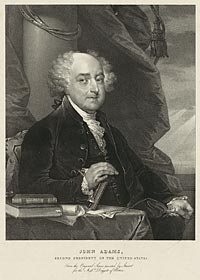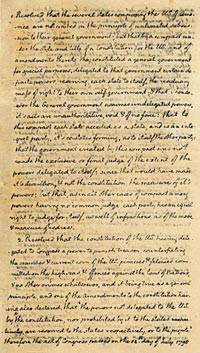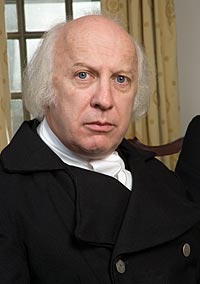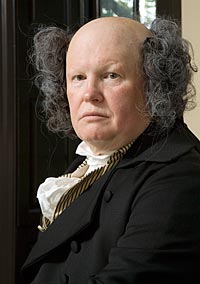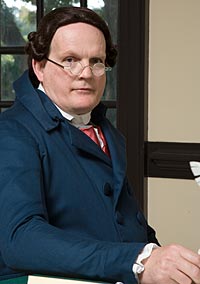Page content
The Alien and Sedition Acts
by Jack Lynch
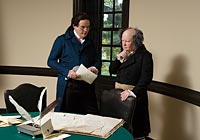
Secretary of State Timothy Pickering, in the person of Garry Underdown, and President John Adams, portrayed by Ken Zeller, confer in 1798 about one of the four Alien and Sedition Acts, laws historian David McCullough says are “rightly judged by history as the most reprehensible acts of” Adam’s administration.
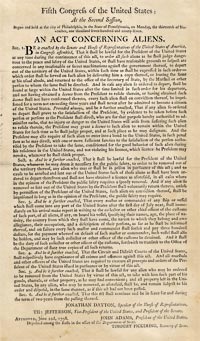
Library of Congress
The Alien Friends Act empowered the president to order out aliens he deemed dangerous to national security.
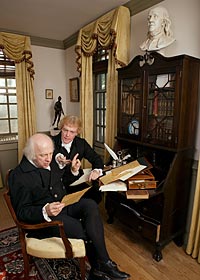
John Douglas Hall portrays James Madison and Colonial Williamsburg's Bill Barker portrays Thomas Jefferson.
The United States, in its infancy in the late eighteenth century, played no direct part in the French Revolution or the napoleonic wars, but those european struggles produced some of the most hotly debated laws in American history. With the passage of the Alien and Sedition Acts in the summer of 1798, American national security was used for the first time as an excuse to engage in party politics, and for that reason discussion of the enactments are as contentious today as they were then.
Ostensibly written to guard against foreign threats in a revolutionary age, the Alien and Sedition Acts were drafted with domestic politics in mind. Political parties were new to America in the 1790s: few of the Founders imagined the rise of party politics in the new Republic, and fewer thought it would be a good idea. Parties meant factions, and the classical tradition was filled with warnings about the dangers of factions: as the Roman historian Livy put it, "Factions have been and ever will be with all nations more fatal in their consequences than Foreign Wars, than Famine, or Pestilence, or any other Public evils inflicted upon Mankind by the Wrath of heaven." As the eighteenth century closed, however, for good or ill, political parties were a reality, the Federalists on one side and democratic-Republicans on the other.
The two parties had plenty of purely domestic differences, but they were especially interested in developments across the Atlantic. The Federalists were suspicious of the radical ideas coming out of France, and supported the British against the French. The Republicans were more sympathetic toward the French ideals of liberté, égalité, fraternité, and sided with the French against the British. For the Republicans, the Federalists were haughty aristocrats for whom the American Revolution meant nothing. For the Federalists, the Republicans were wild anarchists with a hatred for order and stability.
In 1796, when Federalist John Adams narrowly won the presidency and Republican Thomas Jefferson became vice president, the Federalists had the ascendancy. Eager to maintain that advantage, they were glad of a boost from the XYZ Affair. Three French agents, identified only as X. Y, and Z, tried to extort tribute money from the American government. The insult produced a slogan among patriotic Americans: "Millions for defense, but not a cent for tribute." Spending those millions on defense began to seem a serious possibility, for President Adams called the resulting tensions a "half war with France," and ex-President George Washington came out of retirement to take command of the American military. The Federalists benefited: as historian John Chester Miller puts it, "For the first time in his life, John Adams found himself genuinely popular," even hailed as the "second founder of the republic." And the Federalists were determined to hold on to their newfound power.It was against this political background that they began work on the Alien and Sedition Acts.
The Alien and Sedition Acts were four related laws, passed in the space of a month. The first, approved by Congress on June 18, 1798, was "An Act to Establish an Uniform Rule of Naturalization," better known as the Naturalization Act. In the aftermath of the French Revolution, increasing numbers of immigrants were arriving on America's shores, a development that frightened the Federalists. They looked at the demographics of the immigrant population, and did not like what they saw: recent immigrants overwhelmingly supported the democratic-Republicans. They decided to use the law to slow the flow, and extended from five years to fourteen years the term of residency required to become a naturalized citizen. Two more acts followed quickly on the first. "An Act concerning Aliens," or Alien Friends Act, authorized the president to deport foreigners deemed "dangerous to the peace and safety of the United States" during peacetime. A companion law, "An Act respecting Alien enemies" or Alien Enemies Act, allowed the president to arrest, imprison, and deport any foreigner subject to an enemy nation. The last of the laws was "An Act for the Punishment of Certain Crimes against the United States." The Sedition Act, as it was known, declared such activities—as "opposing or resisting any law of the United States, or any act of the President of the United States" and publishing "any false, scandalous and malicious writing" against the president or the Congress—to be high misdemeanors, punishable by fine and imprisonment.
Notice that the vice president was not included in the protections: in 1798, the vice president was Thomas Jefferson, from the rival party, and the Federalists had no objection to criticism directed at him.
The package was signed into law by President Adams on July 14, 1798, and the first indictments soon followed. One of the first targets was Benjamin Franklin Bache, editor of Philadelphia's Democrat-Republican Aurora and the grandson of Benjamin Franklin. Bache was accused of "libeling the President and the executive Government in a manner tending to excite sedition and opposition to the laws." Bache mounted a spirited defense of the freedom of speech and the press, insisting, "One of the first rights of a human is to speak or to publish his sentiments." His case never came to trial because he died of yellow fever.
Two weeks after Bache was seized, federal marshals arrested the Republican rabble-rouser John Daly Burk, accusing him of making "seditious and libelous" statements in his newspaper, The Time-Piece. When David Brown of Dedham, Massachusetts, put up a "liberty pole" bearing the motto "A Speedy Retirement to the President. No Sedition bill, No Alien bill, downfall to the Tyrants of America," he was arrested and charged with "uttering seditious pieces." Luther Baldwin of Newark, New Jersey, was seized for uttering a drunken slur against Adams. Matthew Lyon, a Republican representative from Vermont, was indicted for sedition and bringing "the President and government of the United States into contempt" when he suggested that Adams should be sent to a "mad house" for his foreign policy decisions. All faced up to two years in prison for expressing their opinions: criticism of the Adams administration had become treason against the United States.
Republicans said the Sedition Act was contrary to the letter and the spirit of the First Amendment, which specifies that "Congress shall make no law . . . abridging the freedom of speech, or of the press." As Jefferson wrote to James Madison on June 7, 1798, the Federalists were promoting
a sedition bill, which among other enormities, undertakes to make printing certain matters criminal, tho' one of the amendments to the Constitution has so expressly taken religion, printing presses &c out of their coercion. Indeed this bill and the alien bill are so palpably in the teeth of the Constitution as to show they mean to pay no respect to it.
Were these laws "palpably in the teeth of the Constitution?" The Supreme Court, which determines the constitutionality of laws, did not take them up. Legal scholars have argued since that the Sedition Act in particular was unconstitutional, and the modern Supreme Court seems to agree. in 1964, for instance, Justice William J. Brennan, writing for the majority in New York Times v. Sullivan, concluded that, although the Sedition Act was never tested in court, "the attack upon its validity has carried the day in the court of history."
Brennan is right about "the court of history," where the verdicts have been overwhelmingly negative. The laws are usually regarded as the biggest stain on John Adams' reputation. In his monumental biography, historian David McCullough says of the Alien and Sedition Acts, "Their passage and his signature on them were to be rightly judged by history as the most reprehensible acts of his presidency." Historians have disparaged the legislators who passed the bills: Alan Taylor writes that "probably no American Congress suffers from a worse reputation." The authors of the two most thorough studies of the acts put the case forcefully. John Chester Miller writes that, "by yielding to the temptation to proscribe, under cover of a war emergency, their political opponents as enemies of the country, the Federalist party in effect confessed its unworthiness to lead the nation at a time of tension and peril." James Morton Smith makes the case even more vigorously:
The Federalists were so interested in providing for the security of the state, which they identified with their administration, that they were willing to run the risk of suppressing the liberties of the individual. Arguing that unusual circumstances called for unusual measures, they moved to penalize verbal opposition as well as forcible opposition to the nation's laws. Wishing to eliminate political heresy, they decided to stamp out any criticism which had even a remote tendency to undermine the authority of their administration.
Nearly every later attempt to proscribe sedition by stifling free expression has been condemned in the court of history, whether the Sedition Act of 1918 or the Alien Registration Act of 1940.
Whether they were justified, in practice the laws backfired badly. After the arrest of Bache and the others, the public grew impatient with the once-popular administration. As Miller puts it, in 1798 "the Federalists did not need the Sedition Act to secure a loyal press; generally speaking, they already had it." Not so after the passage of the acts: the number of Republican newspapers exploded. The most vocal advocates of the laws in Congress found themselves out of power. Anger over the Alien and Sedition Acts played a large part in electing Jefferson to the presidency in 1800. Shortly after taking office, Jefferson pardoned everyone convicted under the Sedition Act, and the Congress repaid all the fines they had been forced to pay.
The Alien and Sedition Acts had two unexpected long-term legacies: they prompted the first serious defenses of the principles of states' rights and an almost fundamentalist belief in the freedom of speech. Trying to assert federal power and to limit freedom of speech, the Federalists weakened the federal government and strengthened free expression.
In 1798, two prominent Republicans secretly drafted a pair of related statements that began as a response to the Alien and Sedition Acts, but had much more influence on the course of events. Thomas Jefferson was the author of the Kentucky Resolutions, adopted by the Kentucky legislature November 16, 1798, and James Madison wrote the Virginia Resolutions, passed by Virginia on Christmas Eve, 1798. The resolutions said the federal government has no right to exercise powers not specifically delegated to it by the Constitution, and that "the several States composing the United States of America, are not united on the principle of unlimited submission to their general government." The states, wrote Jefferson, "delegated to that government certain definite powers, reserving each State to itself, the residuary mass of right to their own self-government." Since 1798, this assertion of states' rights has been used in good and bad causes. Prominent among the latter is the defense of slavery grounded on the principles Jefferson and Madison spelled out. Even now, the states and the federal government struggle over power.
In what may be a kind of historical felix culpa, or happy fault, the Sedition Act provoked a more extensive understanding of freedom of speech than anyone had considered before. Even Jefferson, after all, was not opposed to regulating speech; he was simply convinced that it should be done by the states, not by the federal government. As he wrote to Abigail Adams, "While we deny that Congress have a right to controul the freedom of the press, we have ever asserted the right of the states." In the aftermath of the Sedition Act, though, any restriction of speech came to seem indefensible. Republican lawyer George Hay composed "An Essay on the Liberty of the Press; Respectfully Inscribed to the Republican Printers throughout the United States," first printed in the Aurora and then issued as a pamphlet. It begins with an open letter to President Adams: "My object," writes Hay, "is to demonstrate to the people, and to you, that the constitution of the United States, has been violated." Hay says the press should have a "total exemption from legislative control." "It follows," he writes a few pages later, "that no law can be made to restrain the licentiousness of the press." Virtually no one in America had gone so far before, but before long, it became conventional wisdom.
And so, the nation's early experiences with some of the most complicated issues of statecraft resonate today. Much of America's subsequent history can be read as a commentary on those four laws passed in the summer of 1798. Every time we debate the limits of free speech, the nature of treason, the rights of immigrants, and the extent of states' rights, we return to the issues that produced so much controversy for Adams and the fifth Congress. The legacies of the Alien and Sedition Acts are with us still, even as we once again balance the security of the nation against the liberties of the individual.
Extra Images
Jack Lynch, author of The Age of Elizabeth in the Age of Johnson (Cambridge University Press, 2003), is associate professor of english at Rutgers University in Newark, New Jersey. He contributed to the Summer 2006 journal a story on tea and colonial America.
Suggestions for further reading:
- Larry Gragg, Order vs. Liberty, American History 33, no. 4 (1 Oct. 1998): 24–28, 56–59.
- John Chester Miller, Crisis in Freedom: The Alien and Sedition Acts (Boston: Little, Brown, 1951).
- James R. Sharp, American Politics in the Early Republic: The New Nation in Crisis (New Haven: Yale Univ. Press, 1993).
- James Morton Smith, Freedom's Fetters: The Alien and Sedition Laws and American Civil Liberties (Ithaca: Cornell Univ. Press, 1956).
- Alan Taylor, The Alien and Sedition Acts, in The Reader's Companion to the United States Congress: The Building of Democracy, ed. Julian e. Zelizer (Boston: Houghton Mifflin, 2004), pp. 63–76.

